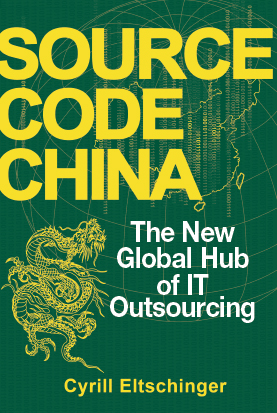Cyrill Eltschinger is a natural entrepreneur. Impeccably dressed, suave and witty, at 7:30 PM on February 19th the Swiss businessman gave a talk about his new book at the Beijing Bookworm. His book:
Source Code China, published in late 2007 by John Wiley and Sons, has been well received internationally. Eltschinger's book is as timely as the man is charming.
Mr. Eltschinger arrived on the Chinese mainland in late 1994, working for a subsidiary of GM after being based in Singapore, the business hub of the Pacific Rim at that time. He recounted how his bosses ordered him to "Go to China and find out what is happening."
"Things were a lot different than they are today," Mr. Eltschinger reminisced. "No expat wanted a posting in the PRC. Business was done in my office via two overloaded fax machines." He went on to explain that the Chinese understood the need for renovation but that many foreign businessmen felt great resistance to any sort of change.
"Global businessmen must adapt to the changing environment," Mr. Eltschinger said. "China has adapted at record speed, going from a strong manufacturing base toward a high end services sector, yet some foreigners still regard China as a place for low skilled cheap labor. That’s not true anymore and that’s what my book addresses."
Mr. Eltschinger wrote his book out of personal frustration: he wanted to advertise to the world what China has to offer from a software/high tech perspective. With the fast growing market, promoting outsourcing with a China destination is crucial, Eltschinger explained. The book has ten chapters and was written for laymen. It covers the high tech sector market, looking first at the global economy and then zooming on to Asia and focusing on China specifically. Three main sections comprise the book: first, a unique survey of selected cities compatible for outsourcing; second, case studies of various outsourcing services; and third, a resource section that lists key agencies, government ministries, and high tech parks, development areas.
According to Eltschinger, outsourcing is divided into business processing outsourcing, hiring outsourcing and knowledge process outsourcing. Business processing and hiring are vast enterprises. Many factors contribute to their success: top sponsorship, treating people fairly, involving employees, good communication, sufficient training, among other things. Eltschinger asserts that the China market provides 90 percent of the factors needed for successful outsourcing. He said that China’s image improved considerably after becoming a member of the WTO and witnessing unprecedented economic growth. .
In fact, he predicts that by 2010 China will become the largest marketplace in the world in many diverse areas: cell phones, IT products, advertising, car parks, commercial aviation, chemicals and waste & recycling industries. Mr. Eltschinger pointed out that historically companies outsourced their business in the 1970’s to Australia, in the 1980’s to Singapore, in the 19990’s to Hong Kong and Japan, but now, in the 2000’s, everyone is heading straight for Mainland China.
 |
Specifically, in regard to outsourcing high tech IT, India has been the main destination for the last twenty-five years but things are evolving fast. "For outsourcing IT India is currently number one, China two, Brazil three and Russia four," Mr. Eltschinger said, "but none of them have China’s potential high tech talent. Everything in China is growing, plus the market is stable. Both India and China have a lot of people but only China has a booming market that also provides access to a world class IT infrastructure. By the end of 2007 China had 210 million Internet users; 77.6 percent were broadband users. This wired market is second only to the USA and consists of only 15 percent of the population. With government subsidies this number is expected to increase enormously very soon." He added that China currently has 15.9 percent of the global Internet users and that Chinese as an Internet language is second to English, with Spanish, Japanese and German trailing afterward.
Mr. Eltschinger said that his book points out how China clearly is transitioning from cheap, low skilled factory labor force toward a high value, high skilled engineering force, especially regarding IT. "In 2007 it’s estimated that China graduated more than 350,000 computer science students as opposed to only 29,000 in 1998," he stated, explaining that the US and India figures have remained flat. "Beijing, Shanghai and Xi’an are the three main training cities for computer science majors and China now has 53 high tech parks for industry and R&D, with 29 of them listed as world class facilities. India cannot compete with that."
When asked why China is still not a highly popular destination for IT industries, Mr. Eltschinger explained that the country has some challenges to overcome. "International trade shows need to be improved," he asserted, adding that many Chinese IT facilities also now have received international standards certifications to validate them globally.
"There are cultural issues, there is the RMB revaluation issue and there is the Indian head start of 25 years." Mr. Eltschinger remarked with a smile that India is now following other global companies into the China market; "India is tagging along, tapping into the Chinese market, tapping into the better rates and larger industries and getting a closer foothold to Japan."
Source Code China enthusiastically promotes China as an outsourcing paradise, with the largest pool of technical talent, ten years of stable, rising economic growth, a world class infrastructure network, English widely spoken, government subsidies for business, infrastructure and workers, and the lowest rates globally.
Cyrill Eltschinger wears many hats in addition to being a writer. He currently is the chief executive officer for IT United, a Softtek company that is affiliated with the internationally renowned IT industry, Gartner. He is also the chair in Beijing for the Swiss Chamber of Commerce, a member on the Board of Governors for the Capital Club, the founder of Texas A&M China Club, and a private pilot. He currently resides in Beijing.
(China.org.cn by Valerie Sartor February 25, 2008)